cut & wound support
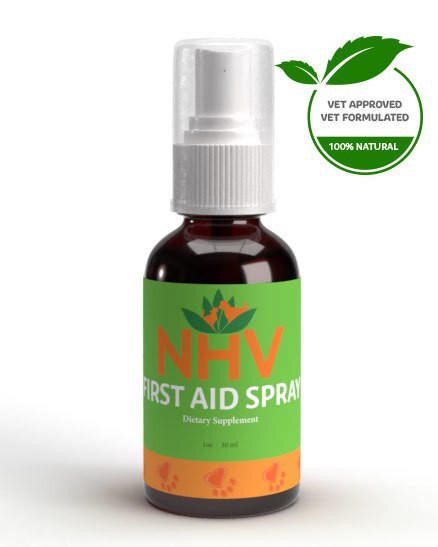
free shipping over $100 (USA & Canada)
1-877-937-4372 the pet expert hotline
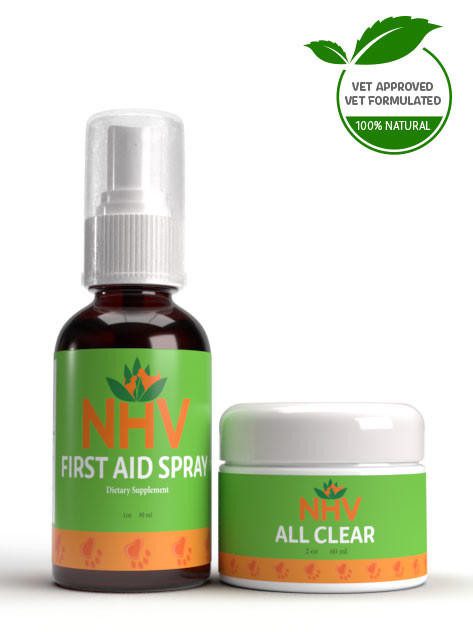
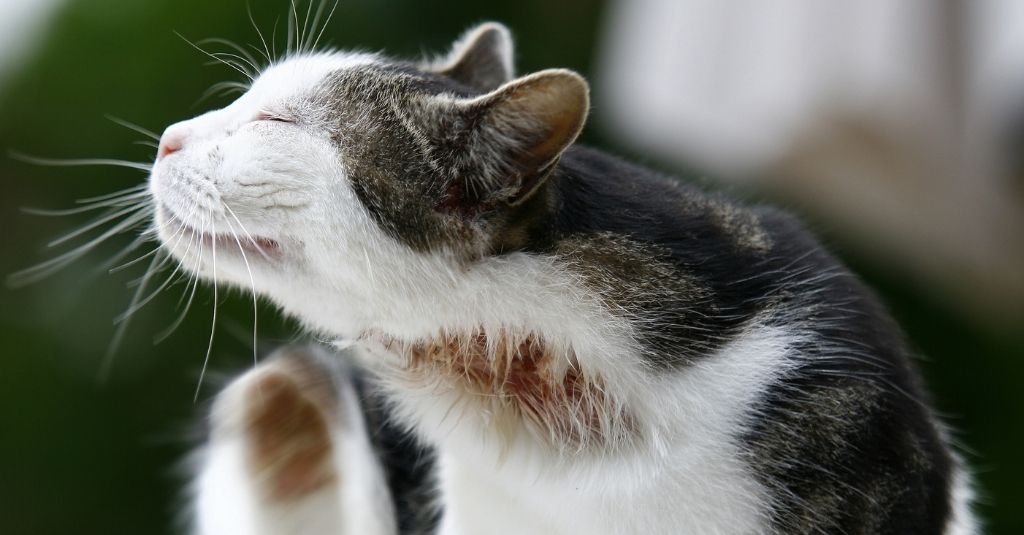
A frequently asked question our pet experts usually get is “how do I treat an abscess?”. Unsurprisingly, abscesses are rather common and some pets may be more exposed than others. Although an abscess would not be considered a life-threatening issue, it is crucial that you use the correct method of treatment.
We wanted to help pet parents get a better understanding of what an abscess actually is, what can be the root cause of the problem, and how to help them heal.
An abscess is described as being an uncomfortable pocket of puss, that is generally caused by a build-up of bacteria, and can be found anywhere on the body.
There are 2 types of abscess: skin abscess – which will develop underneath the skin, and internal abscess – which will develop inside the body. It can develop on organs or spaces between the organs.
Staphylococcus bacteria can be a common cause of abscesses. The infection develops from the bacteria entering the body through hair follicles or from puncture wounds and injuries that cause an opening in the skin. Abscesses in pets are often caused by puncture wounds from other animals, a foreign body in the skin, and infected/rotting teeth. Other causes include impacted anal glands and liver abscesses caused by infection of the blood.
Most causes seem to be a result of pets fighting. Once another animal’s tooth punctures the skin, it buries the bacteria from the tooth, below the skin. When the wound heals quickly or the puncture wound is small, the bacteria will remain trapped under the skin which will then cause an infection.
Bite wounds can be quite dangerous, especially in cats. These open wounds can leave the body more exposed to contagious diseases carried by other feline friends. Two common viruses that cats are exposed to are Feline Leukemia Virus (FeLV) and Feline Immunodeficiency Virus (FIV).
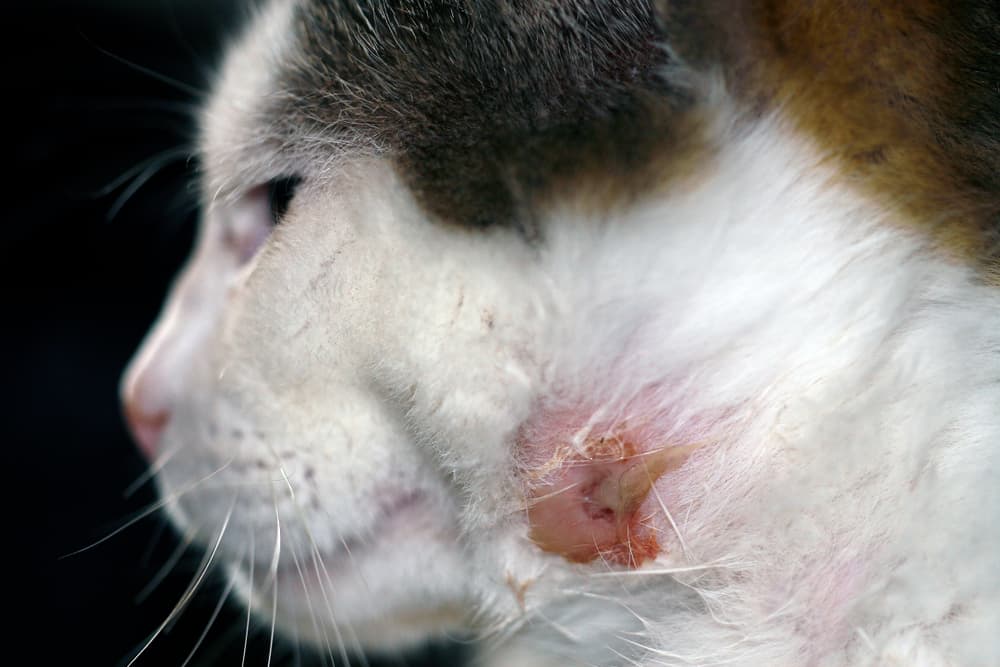
There can be quite a few symptoms associated with an abscess so they can be easy to differentiate from a bump or a scratch:
Cat teeth are known for being more likely to cause an abscess due to their teeth being longer and thinner and easily able to puncture the skin. There are also several types of pathogenic bacteria that live in a cat’s mouth which include Pasteurella Multocida and staphylococcus.
There are, in fact, certain dog breeds that are more prone to abscesses than others. These breeds include Shar Pei, English Bulldog, and Labradors. These breeds all have shorter and stiffer hair, that can end up pushed back into the hair follicle resulting in abscesses.
Male dogs that are older also tend to be more at risk if they are not neutered. They are more at risk of being diagnosed with prostate cancer which can also, at times result in a prostate abscess. Older female dogs that have not been spayed can also end up with mammary gland infections that can cause an abscess.
When left untreated, it can be extremely tough for the body to fight the infection.
If the abscess is treated and managed properly, there is a good chance of healing. When left untreated, it can be extremely tough for the body to fight the infection on its own and can lead to a deeper and more widespread infection. Many abscesses will burst then drain on their own but it is very likely that the abscess will reappear if left without veterinary intervention.
The treatment for an abscess will depend on the location and how bad the infection is. It is really important that the pocket of pus on the skin is either drained and flushed or surgically emptied. If the abscess was caused by a foreign object in the body, then the object must be removed, and if not the abscess will come back.
Antibiotics are usually prescribed to help treat an abscess. The type of antibiotic will depend on the type of bacteria that has caused the problem. When giving pets a course of antibiotics, it is essential that the whole treatment is finished. If you do not finish the course of antibiotics, the bacteria will become even more resistant to that antibiotic and therefore will have no effect if it is to be used again. Your veterinarian will also prescribe discomfort medication to help alleviate the swelling and heat of the area. It is also important to restrict activity to allow the tissue to heal properly.
A big part of the recovery process of an abscess is to monitor the healing. The most important questions you should be asking are:
Trying to avoid a reoccurring abscess will depend on the area and the type of tissue involved. If an anal gland abscess is persistent then it may be best to surgically remove the abscess. If you are to avoid a prostate or mammary abscess, then it may be best to neuter your pet. And if the abscess is reoccurring from bite wounds, it would be in their best interest to keep your pet indoors and try to prevent further fights.
Once your vet’s recommendations are followed, your pet should make a full recovery! In order to help your pet’s system with fighting these infections, our pet experts recommend our Natural Abscess Healing Kit, which contains:
First Aid Spray: is a natural antiseptic that can help to prevent infection. It also promotes healing and helps reduce inflammation. It can also help ease discomfort and irritation on the skin.
All Clear Ointment: can help to reduce inflammation on the skin while helping to ease itching. It contains properties that can help fight bacterial and fungal infections and support the healing of dry, flaky, red, or greasy skin.
Another product that we recommend for abscesses that is not in our Natural Abscess Healing Kit, is Stimmune.
Stimmune: helps the immune system to fight against infection, especially effective for dermatitis and skin infections. As mentioned, abscesses can be pretty persistent so Stimmune can be beneficial when it comes to recurrent infections.
If you have any other questions about abscesses and ways you can naturally support your pet’s health, reach out to our pet experts. We’re always happy to help!
cut & wound support

Natural Topical Spray for Cat Wounds
buy 2 and save $3
As pet parents, we know how much trouble our kitties can get into! Most households have a first-aid kit for humans but are unaware of what to do regarding minor pet emergencies, like a small cut or wound. Having a spray like NHV Cat First-Aid Spray is essential for soothing cuts and scrapes on the go or at home.


As pet parents, we know how much trouble our kitties can get into! Most households have a first-aid kit for humans but are unaware of what to do regarding minor pet emergencies, like a small cut or wound. Having a spray like NHV Cat First-Aid Spray is essential for soothing cuts and scrapes on the go or at home.

Natural Disinfectant Spray for Cat Wounds
Are you prepared for a pet emergency? Most households have a first-aid kit for humans and a basic understanding of human first aid but are unaware of what to do regarding minor pet emergencies. Accidents and injuries can happen anytime so having a cat first aid kit is essential for providing immediate care but is by no means a replacement for proper veterinary care. If your kitty is experiencing any emergency (major or minor), please take them to your trusted vet or emergency veterinary hospital as soon as you can. Also, do keep in mind that cats are very sensitive creatures and when they experience discomfort or stress, they may bite or scratch, so take special care to protect yourself.
How NHV’s Cat First-Aid Spray Supports Healing and Recovery
Cats are highly sensitive, intuitive creatures so even the smallest cut or scratch can cause extreme distress. Ingredients like Neem and Tea Tree oil contain natural disinfectant properties for cleaning wounds and discouraging the development of pathogenic infections. The sedative properties in California Poppy help relax your furry friend’s muscles to reduce stress, encourage healing, and help with discomfort. Aloe Vera’s highly effective antifungal and antibacterial properties are comparable to silver sulfadiazine (a common prescription cream used for treating and preventing infection). Ingredients like Marigold and Usnea, promote faster recovery by offering many beneficial wound and skin-healing compounds.
The Basics of Cat Emergency Care
These are the most important items for building a cat first aid kit:
Support Your Pet Naturally with NHV Supplements
All of our products are 100% natural and formulated by a holistic veterinarian and a master herbalist with more than 50+ years of experience. For any questions about pet first aid or how to prepare for a trip with your furry companion, contact an NHV Pet Expert.
Made with the finest, organically grown, or ethically harvested herbs. Made specifically for pets, vet-formulated and vet approved.
Topical Spray: Spray several times a day to the affected area(s) until healed.
It may sometimes be necessary to shave or trim your pet’s hair so that the First Aid spray reaches the affected area. If necessary, cover the affected area(s) with gauze dressing.
Caution
Do not spray near or into your eyes or nose. May initially sting on open cut
Natural Disinfectant Spray for Cat Wounds
Are you prepared for a pet emergency? Most households have a first-aid kit for humans and a basic understanding of human first aid but are unaware of what to do regarding minor pet emergencies. Accidents and injuries can happen anytime so having a cat first aid kit is essential for providing immediate care but is by no means a replacement for proper veterinary care. If your kitty is experiencing any emergency (major or minor), please take them to your trusted vet or emergency veterinary hospital as soon as you can. Also, do keep in mind that cats are very sensitive creatures and when they experience discomfort or stress, they may bite or scratch, so take special care to protect yourself.
How NHV’s Cat First-Aid Spray Supports Healing and Recovery
Cats are highly sensitive, intuitive creatures so even the smallest cut or scratch can cause extreme distress. Ingredients like Neem and Tea Tree oil contain natural disinfectant properties for cleaning wounds and discouraging the development of pathogenic infections. The sedative properties in California Poppy help relax your furry friend’s muscles to reduce stress, encourage healing, and help with discomfort. Aloe Vera’s highly effective antifungal and antibacterial properties are comparable to silver sulfadiazine (a common prescription cream used for treating and preventing infection). Ingredients like Marigold and Usnea, promote faster recovery by offering many beneficial wound and skin-healing compounds.
The Basics of Cat Emergency Care
These are the most important items for building a cat first aid kit:
Support Your Pet Naturally with NHV Supplements
All of our products are 100% natural and formulated by a holistic veterinarian and a master herbalist with more than 50+ years of experience. For any questions about pet first aid or how to prepare for a trip with your furry companion, contact an NHV Pet Expert.
Made with the finest, organically grown, or ethically harvested herbs. Made specifically for pets, vet-formulated and vet approved.
Topical Spray: Spray several times a day to the affected area(s) until healed.
It may sometimes be necessary to shave or trim your pet’s hair so that the First Aid spray reaches the affected area. If necessary, cover the affected area(s) with gauze dressing.
Caution
Do not spray near or into your eyes or nose. May initially sting on open cut
immune & allergy support
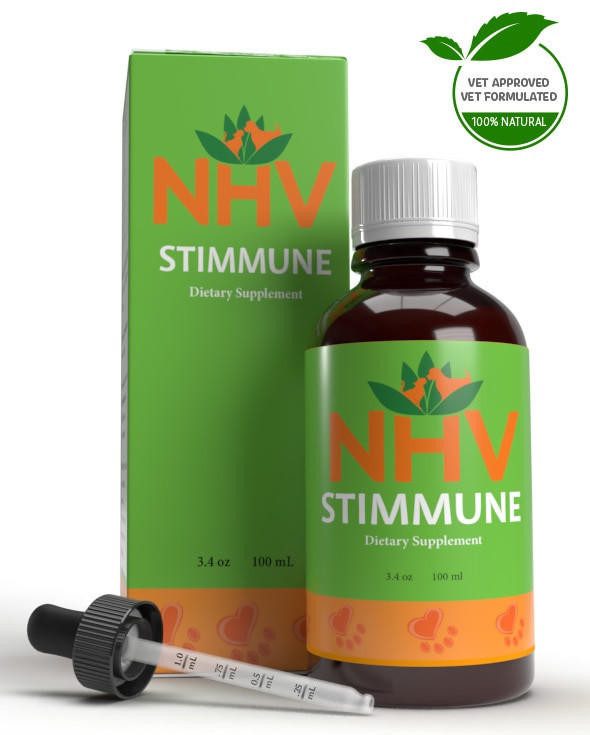
Holistic Remedy for Food Allergies and Immune Support in Cats
buy 2 and save $3
3 month supply for a small to medium size
Helps your cat overcome food allergies, skin allergies, and fight infection.

Helps your cat overcome food allergies, skin allergies, and fight infection.
Cats can be allergic to the things they eat and touch, just like people can. With NHV’s Stimmune, your kitty will get potent immune supporting herbs that help support your cat with food allergy reactions, as well as reactions related to fleas, dermatitis, insect bites, diet, and exposure to chemicals and drugs. For seasonal or environmental allergies, please try Alge-Ex for a remedy specifically formulated for your cat.
At NHV, all of our pet products are formulated by a master herbalist as well as a holistic veterinarian having more than 20 years of experience. Some ingredients are even wild-crafted which means they were ethically harvested from their natural environment. Our products are also safe for long-term use and are supplements that animals like to take, including finicky kitties.
If you have questions about holistic remedies for cat allergies to food or any of our wide variety of products, you can ask an NHV expert. Our very supportive professional team of pet experts are here to help and recommend supplements because, at NHV, we want your kitty feeling pawtastic naturally!
Stimmune Is Also Helpful for:
Cats can get food allergies from their diet, and other allergies from their environment when allergens are inhaled, ingested, or absorbed by the body. Once this happens, the immune system overreacts, and this is when your kitty will need extra balance and support.
Read about a senior cat’s Helenda’s transformation using Stimmune.
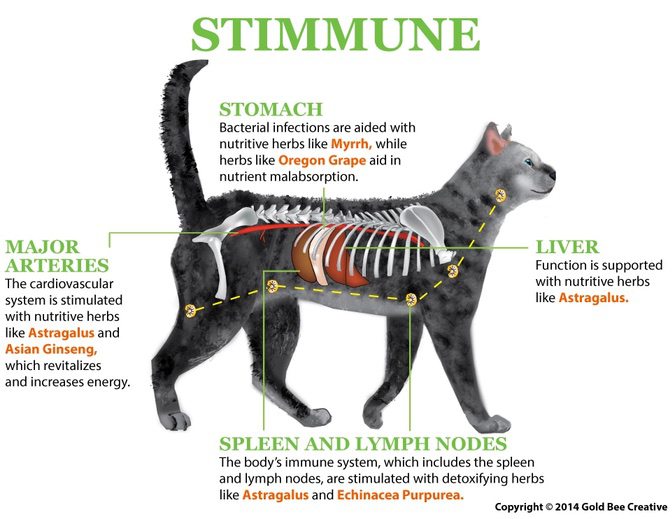
How NHV’s Stimmune Helps Allergies in Cats
Stimmune promotes healthy immune activity and histamine response with five natural herbs formulated to reduce environmental allergies in cats.
Stimmune provides support in addition to conventional treatment for all forms of allergies including pollen allergies in cats.
Select your pet's weight to determine the correct dose.
Cats can be allergic to the things they eat and touch, just like people can. With NHV’s Stimmune, your kitty will get potent immune supporting herbs that help support your cat with food allergy reactions, as well as reactions related to fleas, dermatitis, insect bites, diet, and exposure to chemicals and drugs. For seasonal or environmental allergies, please try Alge-Ex for a remedy specifically formulated for your cat.
At NHV, all of our pet products are formulated by a master herbalist as well as a holistic veterinarian having more than 20 years of experience. Some ingredients are even wild-crafted which means they were ethically harvested from their natural environment. Our products are also safe for long-term use and are supplements that animals like to take, including finicky kitties.
If you have questions about holistic remedies for cat allergies to food or any of our wide variety of products, you can ask an NHV expert. Our very supportive professional team of pet experts are here to help and recommend supplements because, at NHV, we want your kitty feeling pawtastic naturally!
Stimmune Is Also Helpful for:
Cats can get food allergies from their diet, and other allergies from their environment when allergens are inhaled, ingested, or absorbed by the body. Once this happens, the immune system overreacts, and this is when your kitty will need extra balance and support.
Read about a senior cat’s Helenda’s transformation using Stimmune.

How NHV’s Stimmune Helps Allergies in Cats
Stimmune promotes healthy immune activity and histamine response with five natural herbs formulated to reduce environmental allergies in cats.
Stimmune provides support in addition to conventional treatment for all forms of allergies including pollen allergies in cats.
Select your pet's weight to determine the correct dose.
skin & infection support
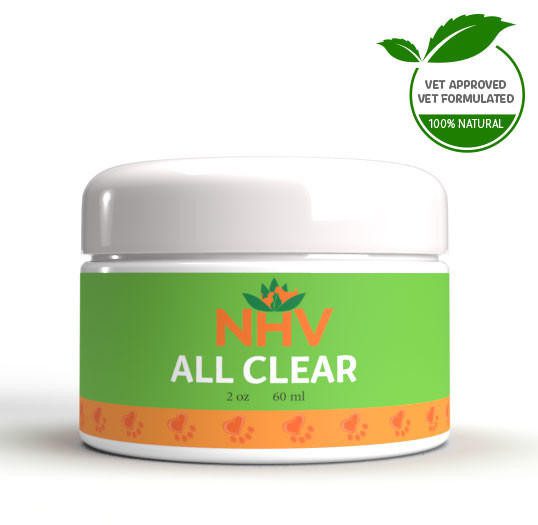
Cat skin dermatitis and other cat skin problems
buy 2 and save $3
A natural soothing and safe ointment. Helps with various cat skin problems, such as cat dermatitis, skin diseases, bacterial, fungal, parasitic and viral skin conditions. Allergens, fleas, ticks, wounds and scratches, may be the cause of these cat skin problem.


A natural soothing and safe ointment. Helps with various cat skin problems, such as cat dermatitis, skin diseases, bacterial, fungal, parasitic and viral skin conditions. Allergens, fleas, ticks, wounds and scratches, may be the cause of these cat skin problem.

Soothe your cat’s irritated skin with All Clear Ointment, a natural herbal formulation that calms and heals skin affected by bacterial, yeast, and fungal infections. Skin irritation is common in cats and can result from a variety of causes including food allergies and irritants like fleas and ticks.
Made with the finest, organically grown, or ethically harvested herbs. Made specifically for pets, vet-formulated and vet approved.
How to Administer
Topical ointment: Clean and dry affected area(s). Apply to affected area 3 to 4 times per day. It may some times be necessary to shave or trim your pet’s hair so that the All Clear Ointment may penetrate better.
Caution
Do not apply on open or bleeding wounds.
Soothe your cat’s irritated skin with All Clear Ointment, a natural herbal formulation that calms and heals skin affected by bacterial, yeast, and fungal infections. Skin irritation is common in cats and can result from a variety of causes including food allergies and irritants like fleas and ticks.
Made with the finest, organically grown, or ethically harvested herbs. Made specifically for pets, vet-formulated and vet approved.
How to Administer
Topical ointment: Clean and dry affected area(s). Apply to affected area 3 to 4 times per day. It may some times be necessary to shave or trim your pet’s hair so that the All Clear Ointment may penetrate better.
Caution
Do not apply on open or bleeding wounds.
Published: April 9, 2020